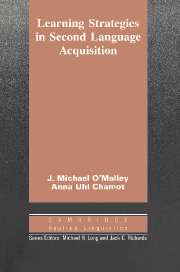Book contents
- Frontmatter
- Contents
- Series editors' preface
- Preface
- 1 Introduction
- 2 A cognitive theory of learning
- 3 How cognitive theory applies to second language acquisition
- 4 Learning strategies: methods and research
- 5 Strategies used by second language learners
- 6 Instruction in learning strategies
- 7 Learning strategies: models and materials
- 8 Summary and conclusions
- Glossary
- References
- Author index
- Subject index
Series editors' preface
Published online by Cambridge University Press: 05 October 2012
- Frontmatter
- Contents
- Series editors' preface
- Preface
- 1 Introduction
- 2 A cognitive theory of learning
- 3 How cognitive theory applies to second language acquisition
- 4 Learning strategies: methods and research
- 5 Strategies used by second language learners
- 6 Instruction in learning strategies
- 7 Learning strategies: models and materials
- 8 Summary and conclusions
- Glossary
- References
- Author index
- Subject index
Summary
Second language teaching in recent years has moved away from the quest for the perfect teaching method, focusing instead on how successful teachers and learners actually achieve their goals. In the case of teachers, this has led to classroom-centered research on the linguistic, discoursal, and interactional structure of teaching events. In the case of learners, it has led to the study of (1) how learners approach learning, both in and out of classrooms, and (2) the kinds of strategies and cognitive processing they use in second language acquisition.
This latter perspective – learning strategies – is the subject of this important book. J. Michael O'Malley and Anna Uhl Chamot survey the role of cognitive processes in second language learning, reviewing the literature on cognitive processes and language learning, and reporting on large-scale empirical investigations of their own. In the process, the authors offer a highly readable account of the nature and significance of learning strategies, and demonstrate how the research findings on learner strategies can be used as a basis for planning more effective instructional practices. This new title in the Cambridge Applied Linguistics Series hence adds another dimension to what we know about second language acquisition. It also shows how the field of second language teaching can benefit from a greater consideration of the role of cognitive strategies in both the comprehension and learning of second and foreign languages.
Information
- Type
- Chapter
- Information
- Publisher: Cambridge University PressPrint publication year: 1990
